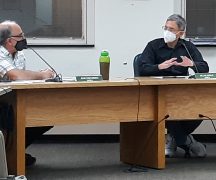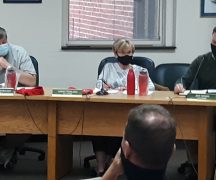By JAN LARSON McLAUGHLIN
BG Independent News
It’s been nearly a year since Bowling Green passed an ordinance requiring rental housing be registered with the city.
Landlords were given a deadline of Dec. 31, 2021 to register their rental units.
As of this week, an estimated 28% remain unregistered.
Of the estimated 7,200 rental units in Bowling Green, 5,152 have been registered and 80 are pending approval, according to Jason Westgate, the city’s code enforcement officer. That leaves just under 2,000 rental units still unregistered.
“We’re still discovering them everyday. It’s an ongoing battle to get them,” Westgate said.
The city’s planning office is using GIS, utilities records and data from the county auditor’s office to help identify rental properties.
Westgate is working with the city prosecutor’s office to make contact with known rental properties that haven’t been registered.
“We’re still trying to catch up and keep up,” he said.
“The onus is on the owner” to register, Westgate said. And the city ordinance allows for fines of up to $250 for every week a rental property goes unregistered after the deadline.
But nearly a year after the deadline has passed, some fines are pending, but none have been issued.
“That’s a real problem,” Westgate said, adding that the city has tried to be courteous to landowners. “It’s been a very long tedious process.”
Municipal Administrator Lori Tretter said the city has tried to make the process easy for landlords to comply with.
“We’ve tried to approach this as bringing people into compliance,” Tretter said.
However, the city will soon be forced to pursue non-complying landlords through the city prosecutor’s office.
“We are rapidly approaching that point,” Tretter said.
Over the last four decades, several city councils in Bowling Green made several attempts at a rental housing ordinance – with the knowledge that most other college communities in Ohio have such legislation in place to ensure safe housing for tenants. But inevitably, local efforts buckled when landlords voiced their opposition to new city mandates.
When it finally passed, the legislation required the more than 7,200 rental housing units in Bowling Green to be registered with the city, have self-certification inspections by landlords, and allow the city to inspect rentals if a tenant reports that the self-inspection results are false.
There is no registration fee being charged.
In October, City Planning Director Heather Sayler said she believed the registration delays are due to several factors. First, the newness of the ordinance has meant many levels of education for landlords. Second, the vast number of rentals has been a lot to handle for the three-person planning office that is also juggling a city zoning code update and new historic preservation efforts. And third, properties are constantly changing hands and purposes.
All the large landlords have registered, Sayler said.
“In some cases it’s obvious” that a house or complex are rentals, Sayler said. But sometimes it’s not so clear. So it means a lot of phone calls and letters, searching of utility bill data, and using fire division plans on file listing the number of units in complexes.
But Sayler believes the registry will be good for the city.
“It’s taking us a while to get the kinks out, but hopefully it will be really useful to everyone,” she said.
To those landlords not responding, the city planning office has mailed out three notices. Information on those who still haven’t responded has been sent to the city’s legal counsel.
“We’ve tried to be as friendly as we could,” Sayler said.
There are some exemptions, such as owner occupied housing with attached rental units, and rentals owned by religious organizations.
The ordinance also requires landlords to do self-inspections of the exteriors and interiors of their properties starting in 2023.
Copies of the completed inspection forms must be presented to the tenants and signed. Necessary repairs must be made. And if the city learns from a tenant that the inspection form was not accurate, then the city can require a third-party inspection.



